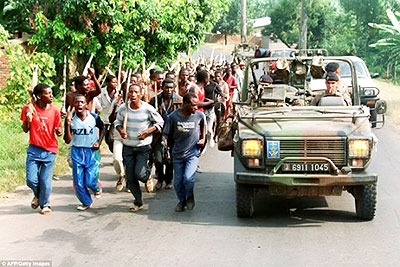Editor,Refer to the article, “Has the world learnt from 1994 Genocide?” (The New Times, January 16).


Editor,Refer to the article, "Has the world learnt from 1994 Genocide?” (The New Times, January 16). The question in the headline presupposes that the world somehow made a mistake – obviously of omission – when it failed to act in Rwanda in 1994 to prevent or stop the Genocide against the Tutsi.If it was known, as we subsequently learnt, that the preparations of the Genocide were well known by those who really make the decisions in the so-called international community, but that they then chose to do nothing, then there are no lessons to be learnt since no mistake was made and all the declarations of "Never Again” and the much-hyped Responsibility to Protect (R2P) are no more than the hypocritical twaddle much beloved of that same non-existent "international community”, which is neither a community nor international but just a very small group of Western countries which are never moved by anything else but self-interests.We have seen in recent developments in DR Congo – where mass atrocities continue to be committed by the UN-supported government’s "army”, which is an agglomeration of a wide range of armed groups – including whole units of the FDLR genocidaires – that the frequent Monusco declarations about protecting civilians is no more than empty sloganeering.Hardly surprising when you consider that UN "peacekeeping” is now the preserve of the French Government who have provided its last four heads, including the incumbent Hervé Ladsous who was the French Deputy Permanent Representative to the UN in New York in 1994, and as such his country’s point-man in ensuring a diplomatic shield to the genocidal Bagosora-Sindikubwabo-Kambanda Interim Government, itself created under the patronage of the French ambassador at his residence in Kigali.Lessons learnt? If anything, the situation is worse now than then. It is an insult when the UN and the Big Powers abuse our dead and traumatised in their geopolitical grandstanding. Furthermore, France remains a safe haven for hundreds of Rwandan genocidal suspects, including Agathe Kanziga Habyarimana. Despite this clear record of collusion with and support to the masterminds of the Genocide against the Tutsi, its Western peers in the UN Security Council have entrusted France with the "pen” to initiate and sponsor council resolutions on our sub-region, despite their full knowledge of France’s criminal track record in the sub-region, including its complicity in the 1994 Genocide and its role in exporting the genocidaires and their deadly ideology to Eastern DR Congo, which they have transformed into a massive perpetual crime scene. When you combine this with the clear conflict of interest in the choice of senior French foreign service officials as the last four UN peacekeeping supremos, having among other core responsibilities primary oversight of advising and implementing UN policy and intervention on FDLR-infested Eastern DR Congo and, thus, Rwanda’s fundamental security interests, you quickly understand that the UN has not evolved an iota from its coldly calculated cynical decision to abandon Tutsis to their obvious fate in 1994. Anyone who might be tempted to entrust their fate into the UN’s hands would do well to draw lessons from that organisation’s untrustworthy behaviour towards Rwanda in 1994, and in its management of the aftermath of the Genocide, including the subsequent Congo situation, up to today.Mwene Kalinda, Rwanda


